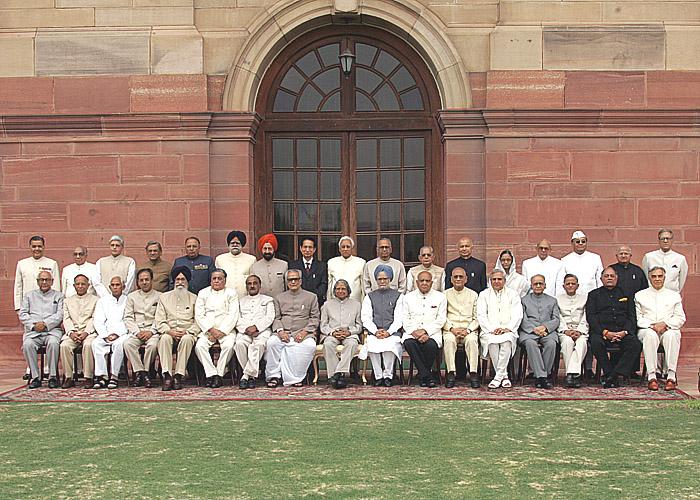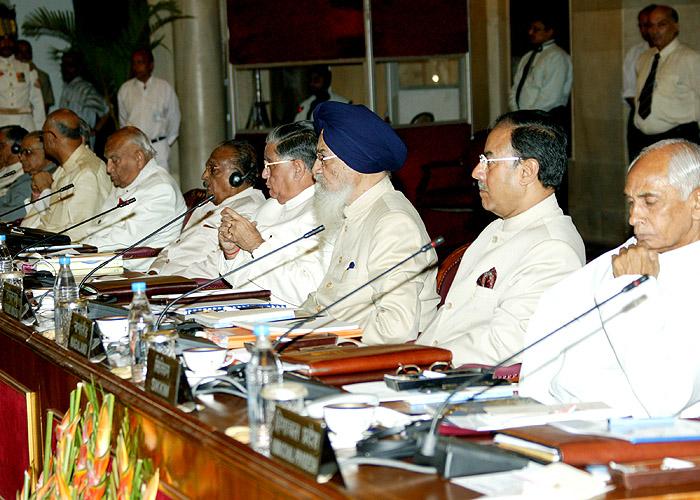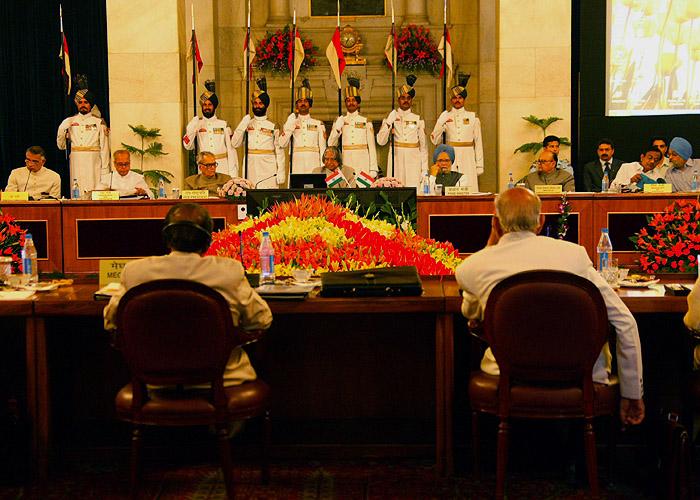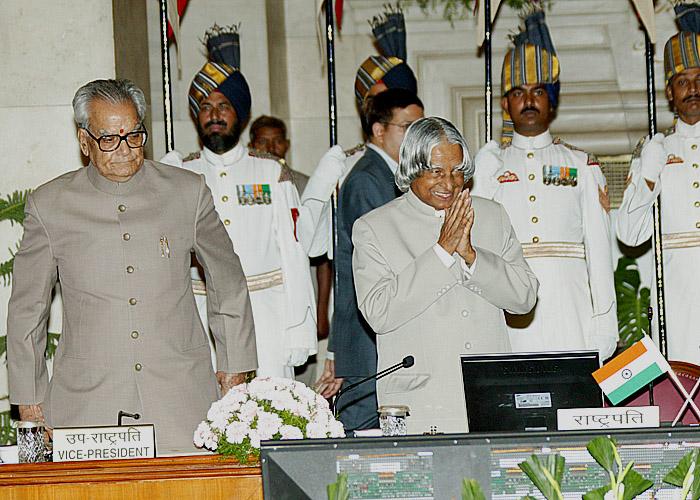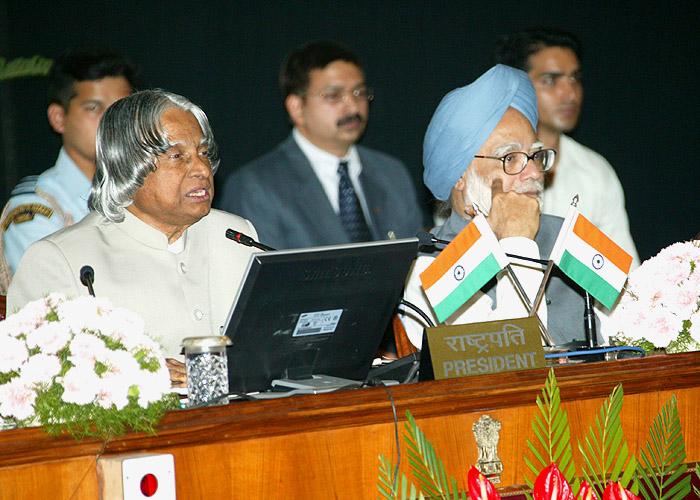Address by the President During the Inauguration of Governors' Conference
Rashtrapati Bhavan, New Delhi : 14-06-2005
Hon'ble Vice-President,
Hon'ble Prime Minister,
Hon'ble Ministers,
Hon'ble Deputy Chairman Planning Commission,
Hon'ble Governors, Hon?ble Lieutenant Governors
Senior officials,
My greetings to all of you. This is my second opportunity to be on this platform of the Conference of Governors. It gives me great pleasure to cordially welcome all of you particularly the Governors and Lieutenant Governors attending the Conference for the first time.
Since this Conference last met in January 2003, our country went through the 14th General Elections which brought in the Government under the leadership of Dr. Manmohan Singh as the Prime Minister. With a long and distinguished record of service to the nation, his mature wisdom would surely stand us in good stead.
Allow me to keep on record the valuable services rendered by the Governors and Lieutenant Governors who have demitted office since this Conference met last and wish them many years of health and happiness. We remember with reverence the distinguished services rendered to the nation by the Late Shri Vishnu Kant Shastri, the Late Shri K.R. Malkani, the Late Shri Sikander Bakht and the Late Shri V.C Pandey with gratitude.
Let me now highlight the actions taken on the recommendations of the last Conference and the agenda for this Conference.
Action taken on Recommendations made in 2003 Conference
With a view to making the deliberations of this Conference productive, the actionable recommendations made during the last Conference were summarised and sent to the Government for follow-up action. Based on the actions initiated by the Central and State Governments on these recommendations, an Action Taken Report was prepared and circulated to all Governors and Lieutenant t. Governors in March 2004. The Ministry of Home Affairs has been monitoring the progress made in implementing the recommended measures and have formulated an updated status report which has also been laid on the table today.
The Mission of Righteousness
You will all agree that the Constitution has provided for a special role for the Governor. It is a position with sanctity. The Governor?s office is a beacon light in the affairs of the State. While there are many checks and balances provided by the Constitution, the office of the Governor has been bestowed with the independence to rise above the day-to-day politics and override compulsions either emanating from the Central system or the State system. The Governor?s role is to distil the best of aspirations of the people from the vicissitudes of politics. It is like preserving the light of Dharma. Friends, I am sure you are all aware of this worldly wisdom.
Can we collectively say that today such a well intended position is upheld by each one of us? The Governor by definition and in the spirit of our Constitution is the First Citizen of the state. You have to decide whether you rise to be a First Citizen or remain caged in the confines of your political or any other ancestry. If you continue to nurture certain affiliations, many will hesitate in approaching you with suggestions and problems. You will be isolated from a large number of people. That is not the purpose of the Raj Bhavan. If you are a true First Citizen, every one will approach you and respect your views. It is a great victory to conquer the peoples? hearts and preserve our democratic traditions.
I am sharing this thought with all of you by quoting from an ancient powerful Tamil Verse:

It means that if people who are in high and responsible positions, go against righteousness, righteousness itself will get transformed into a destroyer for them. The errors of great men are like the eclipses of the greater lights. Whoever deviates from righteousness, whether the individual or the state, is no more than a passing shadow. Let this great thought dwell in all of us and blossom into righteous actions which are all the more important for all of us who deal with the affairs of the people.
Security Imperatives and Border Management
Bearing in mind the increasingly important role of Governors in the context of governance and the growing expectations from them in ensuring the well-being of the people, a few contemporary issues of national importance have been identified for discussion during these two days. I would like to briefly touch upon some of the issues which find place on the agenda for our discussion.
India has for long suffered from the disturbance caused by certain disgruntled elements in society. The innate inequality in our society has been fanned by these elements into fires of hatred and destruction. This could have been transformed into a creative energy of development, leading to a broader social inclusion. There is a siege within. Covert intervention by hostile elements from across the border has also been posing a grave threat to our national security and integrity.
I have visited almost all the forward posts in the Northern Sector. What impressed me was the spirit of our Army and Air Force Personnel and other para-military forces. I saw the Army guarding the borders and checking infiltration and also actively involved in civic action. Helping our fellow citizens and their children will go a long way in restoring normalcy, as also strengthening the bond between the Armed Forces and the civilian population. We are immensely proud of our security forces who have been a strong bulwark against forces inimical to our nationhood and sovereignty. We should also salute those who have laid down their lives in the process.
Notwithstanding the saga of violence unleashed by subversive forces, our conflict-management strategy has kept their activities well under check. Besides continued diplomatic initiatives at various levels, the Central Government conjointly with the State Governments has adopted a multi-pronged conflict-management strategy including the strengthening of border management to check infiltration through the unique border fencing system installed by the Army Engineers.
During my meeting with the King of Bhutan on the occasion of Republic Day, I thanked him for the cooperation extended by his country in flushing out various insurgent groups operating out of Bhutan which has contributed significantly to improving the security situation in both countries. We need to give momentum to similar partnerships with our other neighbours to send a message throughout our region that violence and terrorist activities will not be tolerated.
The long-term remedy rests on our ability to usher in good governance and rapid economic development with a strong mechanism for equity and justice built into it while respecting local sentiments. Given your pre-eminent positions as Governors and Lieutenant Governors, you can all provide the lead in this direction. Governors can play a positive role by their touch of sympathy, compassion driven civic actions and imaginative handling of the situation to create a mindset which is proactive in the task of nation building and national integration.
Youth and Nation Building
Children and youth are the picture of a nation?s future. They are our hope for tomorrow. The youth in India constitutes a sizeable, vibrant and resourceful segment of our society which has a burning desire to scale greater heights. If their energies are properly channeled, they will unleash a momentum that would propel the nation on the fast track to development. We need to carefully nurture this vast and precious human capital by making them a focal point of our planning and development process. There is an imperative need to spell out a vision and in turn evolve missions. Encompassing the needs, rights and expectations of youth to the centre stage of development should be our priority. One of the important tools for such missions is education which has the power of capacity building. I have discussed in detail the importance of education in my address to the nation on the eve of Independence Day 2004.
The whole education system (Primary, Secondary and Higher Education) has to be based on capacity building. This can have five components: Research or Inquiry, Creativity, Innovation, Use of High Technology, Entrepreneurship and Moral Leadership. Teachers and teaching facilities have to facilitate this capacity building.
Primary education needs revamping of the syllabus, teaching methods and the examination system, so that children?s creativity is kindled and allowed to glow. Emphasis should be on exploration, innovativeness and creativity through activities. At the primary stage, education must nurture the child?s curiosity about the environment and integrate the thinking process with the skills of hand, limb and body. At the secondary stage, emphasis should be on experiments, problem solving and team work. The Governors can provide an axis for this movement.
I have been greatly impressed by the thoughtful welfare-oriented initiatives of the Governor of Uttaranchal in the education and health sectors through a societal foundation. This endeavour is benefiting bright children who are economically weak and also helping out children requiring medical attention. I understand that the Governor of Chhattisgarh has also done sufficient ground-work to launch similar humanitarian initiatives in his State. Many of you, I am sure, will be doing similar impressive missions in your states.
The important role of Governors as the Chancellors of the University System
By virtue of being the Chancellor of Universities, the responsibility rests with you to steadily and continuously enhance the stature and quality of the University system. Without meddling into day to day administration, Governors as Chancellors can share their wisdom, experience and thoughts in furthering the interests of the University system. I am happy to note from the Monthly Reports of several Governors, that several of you have shown keen interest in ensuring the healthy functioning of the University system. I found laudable, the efforts put in by the former Governor of Maharashtra to open discussions with eminent scientists with a view to working out the modalities of starting a University of Space Sciences in Maharashtra.
For the healthy growth of the university education system in the states, a coordinated effort between the State Government and the Governor is very vital. During the previous Conference, the Ministry of Human Resource Development had agreed to carry out an exercise in consultation with State Governments to empower the Chancellors while preserving the autonomy of the University system. It was also given to understand in the Action Taken Report that a Model University Act has been prepared by the University Grants Commission in this context. I am sure that all the Governors present here would be eager to hear the outcome of that exercise from the Minister of Human Resource Development. My long association with the Indian Space Research Organisation, Defence Research and Development Organisation and some of the Indian Institutes of Technology, clearly shows that excellence can come only with autonomy to executives and with clear support to risk takers when they meet with failures. I hope the Centre and the State Governments will assist the Governors in building truly autonomous institutions and in realising the purpose of University education.
Recently, the Minister of Human Resource Development and myself witnessed the signing of Memorandum of Understanding between three great Universities with 150 years tradition, namely, Madras University, Mumbai University and Calcutta University. They are planning to have a common syllabus and curriculum, exchange of teaching faculties and students and provide an environment for collaborative research. Joint Graduate, Post Graduate and Ph.D. programmes would now be offered using distance education programmes through tele-education models. This is a unique Virtual University venture fusing the expertise of three state educational systems of Tamil Nadu, Maharashtra and West Bengal. I am sure it could become a template for collaborations between many other Universities to follow.
Disaster Management
Natural and man-made disasters, with varying degrees of intensity have struck our country at close intervals. The nature of disasters have been wide-ranging ? cyclones, floods, droughts, earthquakes, cloudbursts, landslides, forest fires, heat waves, etc. The latest Tsunami disaster has been perhaps the worst natural disaster to have occurred in living memory. It was heartening to find that in the aftermath of the Tsunami, the entire nation collectively responded and our people showed remarkable resilience and tenacity. There will be a presentation on the effects of the Tsunami, rehabilitation efforts and the disaster management system. I am sure all of you will be anxious to know the special institutional mechanism being created for this purpose. I am happy that many amongst us have been seriously studying this subject and suggesting worthwhile remedial measures to handle natural disasters. The Special Report of the Governor of Assam on ?Flood Control Measures? has been taken into consideration by the Task Force set up by the Ministry of Water Resources in formulating its recommendations. The former Governor of Orissa has made noteworthy suggestions to the Central Government for flood control in the Mahanadi hinterland.
Conclusion
As we move towards a developed India with economic strength, competitiveness, knowledge power and technology, productivity needs effective governance and empowered management we also need the gravitational force of ?Invisible Leadership? to hold together multiple endeavours. In the changing scenario, we need leaders whose leadership styles move from commander to coach, manager to mentor, from director to delegator and from one who demands respect to one who facilitates self respect.
I have seen during the last three years, that in the case of any political crisis in a state, the bulk of it has to be faced by the First Citizen that is the Governor. The people and the media focus their attention on the action emanating from the Governor. The Constitution provides measures to deal with such contingencies. While we appreciate their concerted efforts, it is essential for the State Governments and the Central Government to come forward and hedge their post retirement life. In this context the Sarkaria Commission report is pertinent.
I have taken good time in sharing my thoughts. We have a heavy agenda ahead. Wise people arm themselves with elegant erudition ? a practical and expert knowledge of what is going on, not common talk. Knowledge gained in a wise conversation can be of more help than volumes of analysis. I expect the discussions to be objective and purposeful leading to suitable conclusions and a strategy which can be mainstreamed into the process of policy making. I have great pleasure in declaring the Conference of Governors open. May I offer my good wishes to the Governors and Lieutenant Governors for productive interactions, discussions and results during this Conference.
May God bless you.

